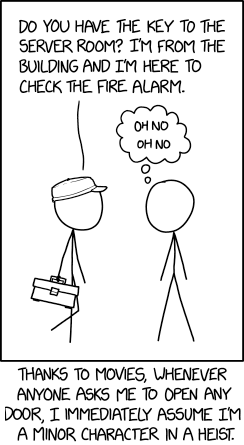Heist

But he has a hat AND a toolbox! Where could someone planning a heist get THOSE?

But he has a hat AND a toolbox! Where could someone planning a heist get THOSE?
Heist films are a type of crime film, generally built around an elaborately planned and executed robbery. Because the drama of such films is based around defeating security measures, the thieves in such a film will often engage in a number of tricks, ploys, and strategies to get around those measures.
Once such measure involves one of the criminals posing as a repairman or something similar in order to gain access to a secure area. This is a form of social engineering which has been used by real life criminals, and is a very common trope in heist films. It takes advantage of the fact that lower-level workers frequently come and go in most facilities, and people tend to assume that someone who looks like such a worker and acts like they belong is exactly who they appear to be. In addition, most people aren't particularly vigilant about security, and demanding identification or verification before allowing access might seem inconvenient or impolite.
Due to the prevalence of this trope, Cueball is concerned whenever somebody asks him "to open any door", because that's exactly the kind of thing someone in a heist movie would do. In such movies, the person who opens the door is usually a "minor character", often having no purpose in the film other than opening the door. These causes concern, because in a heist film, that character will generally facilitate a robbery (or other attack), and possibly be disciplined for it. If the thieves are more violent and remorseless, they might kill the character afterward to eliminate them as a witness.
In this case, he is asked to open the server room - ostensibly to allow the fire alarm to be checked. However, gaining physical access to the server allows the criminal to bypass most security features that should prevent unauthorized access to the data (a scenario known as an evil maid attack). If the hard disks are not encrypted it is trivial to copy all files or even remove and abscond with the disk drives - allowing the theft of sensitive information stored on the network. Even if the files are encrypted physical access to the server will allow the attacker to corrupt the system either by installing malware or adding malicious hardware components, which will then allow them to retrieve passwords and/or encryption keys.
Being aware of these dangers Cueball immediately assumes that he (or his employers) are the target of a heist.
The title text offers sarcastic reassurance, asking how a thief could have acquired a hat (possibly with a company logo) and a toolbox full of tools. This plays on the fact that, when people match our expectations of a particular role, such as having appropriate clothing and equipment, we tend to assume that's who they are, even when such clothing or equipment would be quite easy for an imposter to acquire.
This is the second comic in a row to reference a specific movie genre, this one heist movies. The previous comic, 2076: Horror Movies 2, referenced horror movies.